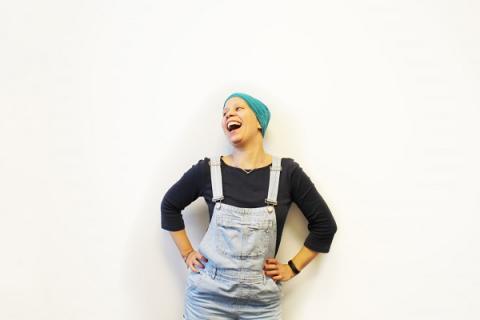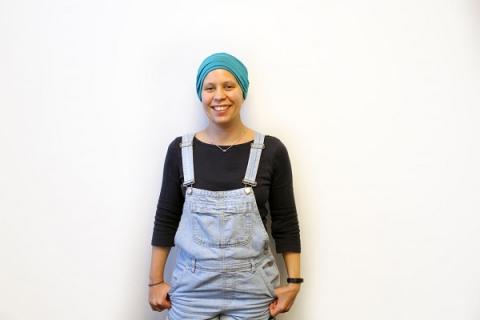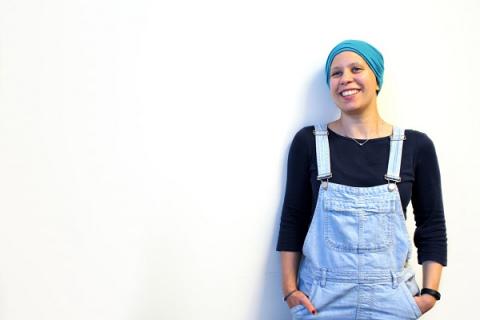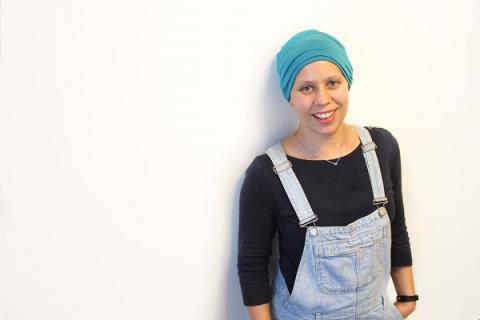The side effects of a transplant can affect your sex life and relationships, whether you’re single or in a couple. Issues like GvHD of the genitals, fatigue, emotional problems and the general stress of a life-changing event can all have an impact. We want to make it easier for all patients and families to talk openly about these issues and get help if they need it.
Emma is 28 years old, has MDS, and she’s had two bone marrow transplants. She spoke to Billie in the Patient Experience team to share her experiences of sex and relationships post-transplant.
It can be difficult to talk about sex and relationships and some people might feel embarrassed or even ashamed bringing it up. What do you think about that?
I probably talk a lot more openly about sex than other people, and it always surprises me when people don’t want to hear as much information as I offer up!
People don’t seem to see sex as something to talk about, which I don’t necessarily think is a good thing. We have this concept that it’s a bit icky to think of someone else having sex, don’t we? And yet it’s all over TV and in the media.
But when it’s our personal lives, we tend to be overly hush-hush about it. Like that part of us doesn’t exist.
You’ve been through a lot of treatment and two bone marrow transplants. Do you feel like it’s affected your ability to meet someone romantically?
Every time I get ill and relapse, my social life is put on hold – so the opportunities to meet new people are fewer.
You’re OK with your close group of friends who are willing to come and see you in hospital or at your house, but when your immune system is low, you can’t get out and about and meet people.
Then as you go through recovery, especially after the transplants, there are body changes. Like right now, I’m covered in rashes, and it makes you really self-conscious about wearing nice clothes. At the moment I live in my tracksuit bottoms and comfy tops, and the idea of going out on the town and getting dressed up doesn’t appeal.
I don’t particularly like what I look like at the moment; I don’t really recognise myself or feel like myself. I think that’s actually more important to me, because I feel lethargic and grumpy at times and a bit depressed, so I don’t want to go and meet someone new.
I don’t particularly like myself right now. Why would anyone else like me?
You’ve touched upon body image there, and I wanted to talk to you more about that as I know it’s something that affects a lot of patients. Is there a particular element that upsets you or you that you feel vulnerable about?
With cancer, I think people often assume that losing your hair is the worse thing in the world – but I’m not bothered about that, in all honesty. I think I carry it off quite well! And there are options for me with scarves and wigs, so if I wanted to do something about it, I could. I don’t see it negatively.
With this second transplant I’ve been in hospital since September, and I’ve just lost all my muscle mass. I was an aerobics instructor before, so I used to teach classes in body pump. I had a bit of fat (I’m not in a race to be a size 6!) but I was solid muscle and I felt really good about my physique and being strong.
I just don’t feel like me, being flabby and weak – the body shape change is a big thing for transplant patients. Either you lose lots of weight or you gain it, and not having the energy to exercise is a pain. Just going out with the dog at the moment is enough for me but it’s frustrating as I want to go for a run!
I’ve got scars from all the various things I’ve had done, like my Hickman line, and they bother me. I don’t care too much about the look of them, but they’re obvious, so people ask questions about them. Especially in more intimate situations, as they’re right across my boobs!
How does it feel to tell a potential new partner what you’ve been through?
It’s more like, when do you tell someone what you’ve been through?
It’s not a first-date conversation. But equally, I feel like I’d be lying if I went on a date and they asked what I did for a living – because right now, I don’t do anything.
I don’t want to talk about myself like the treatment is my life. I want to talk about my job and my gym stuff, because that’s who I am, and what I’d be doing if I could. But if I went along like that was the case, I’d be lying. Which is really hard.
But then you don’t want to rock up on date one and be like, ‘Hey, I’ve got cancer!’
If it’s someone you know, it’s a bit different – if it’s a friend of a friend, someone who knows some of your backstory, it’s not too much of an issue. But if it’s a new person, at what point do you tell them about this baggage you’ve got?

Did you notice a change in your sex drive during treatment?
In general, I have quite a low sex drive until there’s a man in the picture. If I haven’t got it, I’m not overly bothered, but when I meet someone new, I want it!
I don’t know if that’s a bit of coping mechanism as well, though, because I am ill and an active sex life feels pretty unattainable to me.
Was your sexual function discussed with you with your transplant team?
It’s in the booklets, but I don’t remember anyone bringing it up with me.
I remember a friend who had a transplant, being told by the nurses that she wouldn’t want sex at all. But when she got home from the hospital she said it was the first thing she wanted to do with her partner!
To have that comfort and normalcy in their relationship – I thought that was wonderful.
What did you know about your fertility pre-treatment?
My doctors went full steam ahead with my transplant, and it was all booked in before anyone told me that my treatment would make me infertile. I learnt that from a patient who was going through transplant at the same time as me, so I actually had to bring it up with my doctors to get my eggs frozen like her.
Maybe because the majority of patients already had kids, or were past the age of starting a family, the doctors didn’t think to talk to me about it. We actually had to move the transplant date in order for me to have fertility treatment.
I think it’s not at the front of doctors’ minds as they’re trying to save your life, but I was a 24-year-old woman and it was something that was missing from our conversations.

When you think about sex with a potential new partner, do you have any negative thoughts about being treated as physically fragile due to your illness? Do you sometimes wish you could keep it from people?
I think that’s probably an issue for me in general when I think about being in a relationship. I hate the idea of entering into a relationship with someone who feels like they need to be my carer.
I see myself as quite an independent person. I don’t want anyone feeling like they have to care for me, unless I ask for it; it has to be my choice. My parents probably struggle with that a bit.
I certainly don’t like the idea of a guy being all namby-pamby with me in bed because I’ve been ill.
Have you had any experience of that?
In the last year or so, I’ve been a bit more inclined to find someone to have a bit of fun with, as opposed to anything more serious. They’re likely to be friends, but people I haven’t necessarily told my full story to (just in case you thought I was picking random men up off the street!).
There’s a definite comfort in having sex with someone and not having to talk about cancer, but I think it usually only happens a couple of times – if that, depending on the level of lighting!
Then they notice the Hickman line scar, and I’ve got the choice of whether to say anything. Normally people ask me if I have been bitten, if they’re mosquito bites, so on some occasions I’ve said, ‘Yes, they are.’
There’ve been other times when I’ve said, ‘No they’re not, but let’s maybe talk about it another time.’ But then things tend to turn really awkward. It never goes back to the fun and lightness that was there before – now they know there’s something to talk about.
I’ve also tried to be honest and give a brief explanation, but inevitably you end up talking about it for a long time and it kills the mood. You can instantly feel a change in the way they look at you, too. It’s like they think, ‘I can’t just have sex with this person; she’ll get attached because she’s got cancer, and she needs someone to be with her.’
But actually, I don’t – with these guys, I just needed some relief.
Is your self-confidence affected by some of the experiences you’ve had?
I’m not very good at getting close to people – I put on a bit of a persona that’s quite self-assured.
But in all honesty, I find that when it comes to having sex, my confidence tends to completely go. Half the time, I’m just caught up in working out if it’s going to be a temporary thing or not. I don’t know if that’s about confidence, or being brave enough to try and find someone to be in a proper relationship.
I wonder if I have a couple of years of freedom without this disease harassing me. Will I be able to build up a level of normality? Will I ever find it easy to break down the walls that I’ve put up to protect myself?

You’ve mentioned to me that you do want to meet someone for a relationship –was that on your radar after your first transplant? Or was it after your second transplant that you started to think, that’s something I’d like?
I was very unwell after my first transplant, so that wasn’t on my radar at all, I was never in a position to start a relationship because I relapsed again in 2013, but after that load of chemo I felt like me again.
So the year after that I started to put myself out there more. I started to feel more confident about my body, and a bit more confident about who I am. I felt like I’d beaten the MDS and it was behind me.
So I went to swing dances to try and meet new people. It was more about increasing my social circle overall, whether it was for a relationship or not. When I moved to London I didn’t have many friends outside of my work colleagues.
Looking at Facebook groups for cancer patients and the forums I’m on, I’ve always envied those people who had a partner throughout their treatment. It must be so hard on the partner, but for the patient they’ve got that support and someone to be a bit closer with.
The main thing I miss about not having someone is companionship. Someone to go the seaside for the day with, someone to plan things with. Lots of my friends are coupled up now and I’ve missed out on some opportunities for that, being ill.
I had no problem being in hospital this New Year’s Eve, because otherwise I’d have had nowhere to go. My friends were all doing things with their partners. When I think of a NYE party specifically designed for singletons – hospital really doesn’t seem all that bad!
Do you think it’s important to raise awareness about sex and relationships post transplant?
Yes, definitely. You don’t realise what a stop it puts on your life – in all areas, but in particular, intimacy.
For a time, your social life just completely drops off; it does put you off sex, all the chemo and the fatigue. People don’t talk about these things, and I think if we did it would help both single people and those working through a relationship.
In general, I think the mental health side of things is neglected a bit in post-transplant care and intimacy; self-esteem and relationships are tied into that.
The main thing is that everyone should be treated as an individual after transplant, and not just as another ill person. It’s something that bugs me! There might be patients who’d like to continue to have sex and maybe don’t know if they can because of the drugs they’re on. If doctors spoke to patients about it, they’d feel like they had a bit more control over elements of their lives.
